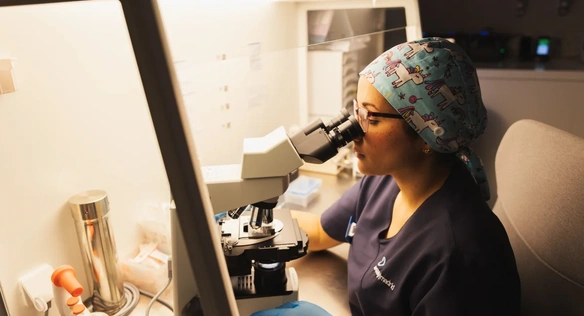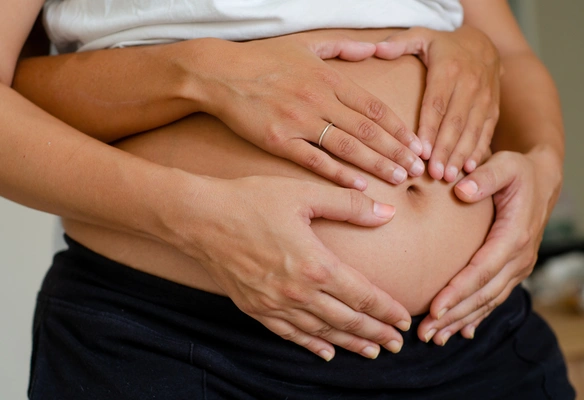We fertilize the eggs in the laboratory using sperm from the partner or a donor.
IVF/ICSI with PGT
Babies free from hereditary diseases

The IVF/ICSI treatment with PGT makes it possible to select genetically healthy embryos before implantation in the uterus. Thanks to Preimplantation Genetic Testing (PGT), chromosomal abnormalities or hereditary diseases can be identified, increasing success rates and reducing the risk of genetic transmission.
What is IVF/ICSI treatment with PGT?
IVF with PGT combines in vitro fertilization with a genetic analysis of the embryos. Through advanced molecular diagnostic techniques, embryos at the blastocyst stage are analyzed to select those without genetic alterations before transferring them to the uterus.
At Fertility Madrid we use the PGT-Complete test, one of the most comprehensive techniques available, which allows us to:
- Confirm the genetic parentage of each embryo
- Identify abnormalities even in embryos initially considered unsuitable
- Determine the origin of the genetic alteration (maternal or paternal)
In which cases is this treatment recommended?
PGT is especially indicated for:
- Women of advanced maternal age
- Recurrent miscarriages
- Implantation failures after several attempts
- Couples who are carriers of hereditary diseases
- Chromosomal abnormalities in the karyotype (translocations, inversions)
- Structural or numerical chromosomal abnormalities
- Couples with a history of monogenic diseases
- Alterations in sperm meiosis
Diseases detectable through IVF with PGT
Some genetic diseases that can be prevented thanks to this treatment are:

- Cystic fibrosis
- Duchenne and Becker muscular dystrophy
- Fragile X syndrome
- Beta-thalassemia
- Spinal muscular atrophy
- Fanconi anemia
- Marfan syndrome
- Sickle cell anemia
- Neurofibromatosis type I and II
- Menkes disease
How does the process work step by step?
FIV/ICSI
Embryo culture
The embryos are cultured until day 5–6 (blastocyst stage).
Embryo biopsy
Several cells are extracted from the embryo without harming it, for genetic analysis.
Genetic diagnosis
We identify genetically healthy embryos through PGT techniques.
Transfer
The most viable embryo is transferred to the patient’s uterus.
What does our treatment at Fertility Madrid include?
- PGT-Complete genetic test
- Ultrasound and hormonal monitoring
- IVF or ICSI, depending on the case
- Embryo biopsy and genetic analysis
- Embryo transfer
- Preservation of remaining embryos
Treatment cost and financing
Consult with our team for exact conditions and payment options. At Fertility Madrid, we offer financing plans so you can start your
treatment without worries.

Frequently asked questions about IVF with PGT
Does PGT harm the embryo?
No. The biopsy is performed by experts and does not affect its viability.
Are the chances of pregnancy higher?
Yes, by transferring only healthy embryos, success rates increase.
What happens to the embryos that are not transferred?
They are vitrified for future attempts or discarded if they have abnormalities.
Is it recommended for all couples?
Not always. The medical team will assess whether it is the best option in your case.
Are the chances of pregnancy higher?
Yes, because it allows the transfer of only chromosomally normal embryos, which increases the likelihood of implantation and reduces the risk of miscarriage.
What happens to the embryos that are not transferred?
Embryos without genetic abnormalities that are not used at the time can be frozen for future use; those with abnormalities are not transferred.
Is it recommended for all couples?
No, it is recommended in specific cases such as a history of genetic diseases, recurrent miscarriages, advanced maternal age, or implantation failures. The recommendation is determined by the medical team after evaluating each case.
When is PGT performed during IVF?
It is usually performed on day 5 or 6 of embryo development, at the blastocyst stage, before the embryo is transferred to the uterus.
Is it necessary to freeze the embryos after PGT?
Yes, in most cases they are vitrified while waiting for the results and are transferred in a subsequent cycle.
Does PGT detect all genetic diseases?
No, only the alterations for which the test has been designed, such as aneuploidies or specific mutations known in the family or identified in a genetic compatibility test, can be detected.